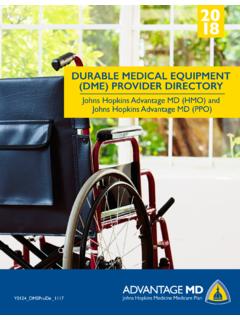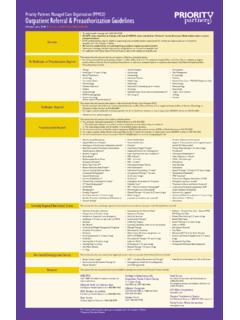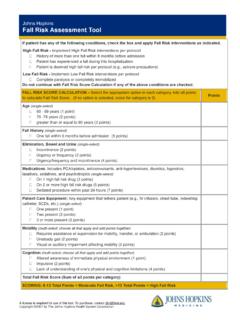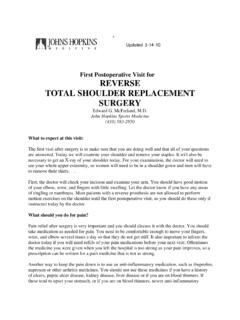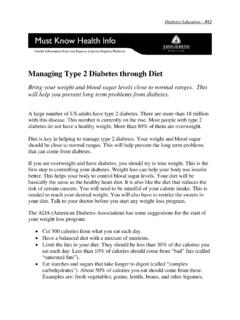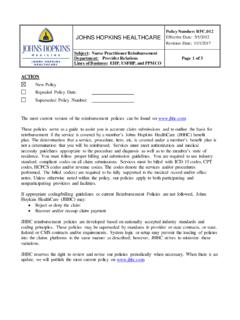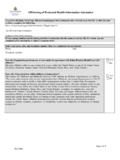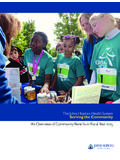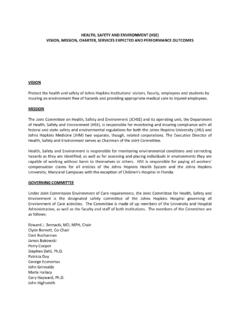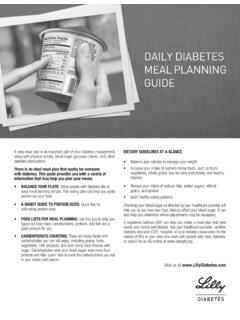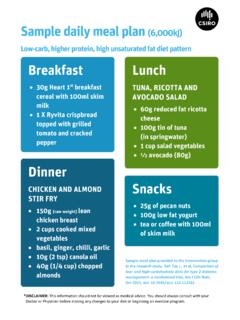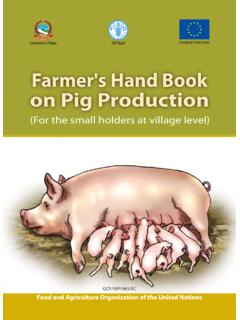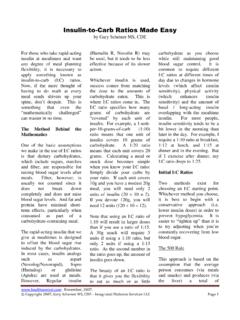Transcription of NUTRITION AND FOOD SAFETY - Hopkins Medicine
1 NUTRITION AND FOOD SAFETY Medications, Recreational Substances and Supplements Many medications and supplements can interact with your transplant medications. This can cause you to feel unwell and can even lead to severe problems including the loss of your transplanted organ. Any time you plan to change, start, or stop a medication, please call the transplant office and ask to speak to your coordinator. In general, we do not recommend ANY herbal supplements after transplant. There are a few reasons for this: Manufacturers are not required to prove an herbal product is effective or safe. Herbal products are not standardized. You may get different amounts of the ingredients in each bottle of an herbal product, even if it is the same manufacturer. There is often little information on how herbal supplements interact with transplant medications. Without knowing if a supplement may hurt you, we would recommend that you do not use it. Some of your transplant medications can cause your body to lose vitamins and minerals.
2 Based upon your routine blood work, your transplant team may ask you to take more or less vitamins and/or supplements. While most vitamins and minerals are safe to take, please do not take them unless approved by your transplant team. Food Most foods and drinks are completely safe for you to take after transplant. Please AVOID grapefruit, pomegranate, pomelo, blood orange, and black licorice, as these can increase the amount of anti-rejection medication in your body and this could harm you. Marijuana in any form can increase drug levels of your rejection medications and should never be used. Some spices in large amounts may effect drug levels, such as ginger and turmeric. NEVER take medications or supplements without calling the transplant office This includes herbals, homeopathic products, vitamins, and minerals. This includes medications prescribed by anyone that is not a part of the transplant team. Do NOT TAKE foods that contain: pomegranate, pomelo, grapefruit, black licorice, marijuana, and marijuana derived products (which included CBD oil and hemp seeds).
3 Please refer to Food SAFETY for Transplant Recipients: A need-to-know guide for bone marrow and solid organ transplant recipients for more information. For more information on food SAFETY , food outbreaks as well as general food SAFETY recommendations: NUTRITION AND FOOD SAFETY Food SAFETY Immunosuppressive medications are important, as they protect your transplanted organ. A side effect of these medications is that they leave you more susceptible to developing foodborne illness from raw or undercooked foods. After transplant you must be careful when handling, preparing, and consuming foods. Four Basic Steps to Food SAFETY : 1. Clean: Wash hands and surfaces often 2. Separate: Separate raw meats from other foods 3. Cook: Cook to safe temperature 4. Chill: Refrigerate promptly SAFE EATING TIPS: Ensure all food is properly cooked Do NOT eat any raw or undercooked meats, proteins, dairy or egg products; this includes sushi, raw cookie dough/cake batter, over-easy eggs Reheat all leftovers Microwave or cook all lunch meats Avoid buffets Do not use wooden cutting boards Use separate cutting boards/utensils for raw meats Make sure all products are pasteurized Wash all fruits and vegetables thoroughly Only eat at safe, clean, trusted restaurants Do not eat food that has been sitting out or exposed to direct sunlight, such as at picnics NUTRITION AND FOOD SAFETY Type of Food AVOID SAFE Meat and Poultry Raw or undercooked meat or poultry Meat or poultry cooked to a safe minimum internal temperature *Use a meat thermometer to check the internal temperature of food Seafood Any raw or undercooked fish, or shellfish, or food containing raw or undercooked seafood , sashimi, found in some sushi or ceviche.
4 Refrigerated smoked fish Partially cooked seafood, such as shrimp and crab Previously cooked seafood heated to 165 F Canned fish and seafood Seafood cooked to 145 F Milk Unpasteurized (raw) milk Pasteurized milk Eggs Foods that contain raw/under cooked eggs, such as: Homemade Caesar salad dressings* Homemade raw cookie dough* Homemade eggnog At home: Use pasteurized eggs/egg products when preparing recipes that call for raw or under cooked eggs When eating out: Ask if pasteurized eggs were used and yolks cooked *Most pre-made foods from grocery stores, such as Caesar dressing, pre-made cookie dough, or packaged eggnog are made with pasteurized eggs Sprouts Raw sprouts (alfalfa, bean, or any other sprout) Cooked sprouts Vegetables Unwashed fresh vegetables, including lettuce/salads Washed fresh vegetables, including salads Cooked vegetables Cheese Soft cheeses made from unpasteurized (raw) milk, such as: Feta Brie Camembert Blue-veined Queso fresco Hard cheeses Processed cheeses Cream cheese Mozzarella Soft cheeses that are clearly labeled made from pasteurized milk Hot Dogs and Deli Meats Hot dogs, deli meats, and luncheon meats that have not been reheated Hot dogs, luncheon meats, and deli meats reheated to steaming hot or 165 F *Reheat hot dogs, deli meats before eating them.
5 P t s Unpasteurized, refrigerated p t s or meat spreads Canned or shelf-stable p t s or meat spreads HEALTHY NUTRITION A healthy diet is just as important after lung transplant as it was before transplant. The focus after transplant centers around providing adequate calories and nutrients for wound healing and getting you back on your feet as quickly as possible. As you heal, recommendations may change. After the first few months, you may need to make adjustments to your diet. You, along with a dietitian, will come up with health goals and an eating plan that will keep you safe and meets your specific nutritional needs. Your diet immediately following surgery: 1. Eat higher amounts of protein to help with wound healing. Extra protein may also be needed to help prevent muscle breakdown related to high doses of steroids. Protein rich foods: Fish, poultry, beef, lamb, pork Nuts and seeds Dairy products, eggs Soy products, legumes or lentils 2.
6 Reduce sodium if you have fluid retention or high blood pressure. Limit your intake of: Canned Soups Processed meats/lunch meats Frozen entrees Convenience and processed foods Condiments Fast Foods 3. Eat a variety of different foods to ensure you get adequate nutrients for recovery. 4. Limit simple carbohydrates to manage elevated blood sugars (can be worse on prednisone) 5. Watch potassium levels. You may need to limit intake of potassium rich foods because of elevated potassium level due to cyclosporine or tacrolimus. Diuretics used to help manage fluid retention, may lower potassium. A list of foods high and low in potassium is on the next page. Achieve or Maintain Healthy Body Weight Increased hunger due to long-term steroid use, lack of exercise, fluid retention, and poor eating habits can lead to unwanted weight gain. It is important that you maintain or achieve a healthy weight to reduce the risk of developing diseases associated with being overweight.
7 Speak with your transplant dietitian about strategies to help you reach your healthy weight. Keys to weight management : 1. Portion control 2. Choose whole grains, beans, lean meats, vegetables, fruit and low fat dairy products. 3. Drink plenty of water 4. Limit foods high in sugar, simple carbohydrates and calories. 5. Establish an exercise regimen after talking with transplant team. In addition to weight gain, post-transplant medications can put you at risk for diabetes, heart disease, and bone disease. These conditions are discussed later in the book (see page 63). Foods High in Potassium Potassium is important in maintaining a healthy heart, nerves, and muscles. High potassium levels, a condition known as hyperkalemia, can be caused by dehydration, kidney disease, and medications. Low potassium levels, or hypokalemia, can be caused by vomiting, diarrhea, dehydration, and medicationsFoods High in Calcium Calcium is a mineral that your body uses to help muscle movement and build strong bones and teeth.
8 High calcium levels can be caused by kidney disease, and some medications. Low calcium levels is common because most adults do not get enough dairy in their diet. It can be caused by medications, kidney disease, and low vitamin-D levels. HIGH MODERATE LOW FRUITS Apricots, avocados, bananas, figs, dates, raisins, prunes, orange juice, coconut water, mango, papaya Apples, pears, blackberries, cherries, peaches, cantaloupe, oranges, nectarines, kiwi, honeydew, strawberries, pineapple Applesauce, blueberries, cranberries/juice VEGETABLES Pumpkin, white & sweet potatoes, rutabaga, winter squash, lentils, tomato juice/sauce, vegetable broth, dried beans, peas, spinach Asparagus, broccoli, Brussel sprouts, cabbage, corn, kale, cauliflower, collard greens, cucumber, green pepper, mushrooms, peas, chili pepper, okra, chili pepper, okra, onion, Carrots, green beans MEAT/CHEESE/STARCH Walnuts, pecans, almonds, peanuts, cashews, bran, whole grains Cereal, pasta, mayonnaise, noodles, bread, butter, margarine, cream, salad dressing OTHER Salt substitute Chocolate, cocoa, coconut, milk, ice cream, molasses Jam, jelly, cake, cookies, soda, coffee, tea.
9 Sugar substitute Molasses Bok choy Broccoli Canned salmon Canned sardines Cheeses Collard greens Dairy products Enriched bread Legumes Tofu Nuts Okra Pinto beans Spinach Yogurt Calcium fortified cereals Calcium fortified orange juice Foods High in Iron Iron is used by red blood cells to carry oxygen to your body. If your body does not have enough iron, your red blood cells cannot carry oxygen efficiently, and you can feel tired. Low iron is common. Meats have the best source of digestible iron. Fortified cereals Whole grain or enriched breads Lentil Baked potato with skin Beans Clams Eggs Fish Kale Liver and organ meats Mustard greens Oysters Spinach Pumpkin seeds Firm tofu Foods High in Magnesium Magnesium is a mineral that helps to regulate your muscles, nerves, and heart. Low magnesium levels can be caused by decreased absorption, diarrhea, and some transplant medications; and may make you feel weak. Cereals: bran flakes, oatmeal Nuts & seeds Broccoli Peas and beans Green leafy vegetables Avocado Brown Rice Milk Beef Fish Prunes Soybeans Firm tofu Spinach Foods High in Sodium Sodium is used by the body to help control fluid balance, if you have too much, you can get swelling or high blood pressure.
10 Most canned, pre-prepared foods, snacks, and restaurant meals are too high in sodium and you may be eating too much salt even if you don t add salt to your food. Check NUTRITION labels to become aware of the sodium in the food you eat low sodium levels can be caused by too much water intake, as well as medications. Most restaurant food Fast food Smoked, cured, salted meat Deli meats Frozen dinners Canned vegetables and beans Canned soups Salted nuts Cheese Olives Pickles Pasta Sauces Soy Sauce Marinades and salad dressing8 Practice Reading a NUTRITION Label: Worksheets It can be difficult to keep track of all the calories, sodium, cholesterol and carbohydrates in your diet. NUTRITION Labels can help you! Use the following questions to review and practice how to use NUTRITION labels. 9 Answers to NUTRITION label sheet: 1. 60 x 21 = 1206 calories 2. 20 gram carbs 3. and 4. 80 calories from carbs and 27 calories from fat (2 serving x 9cal/gm) 5.
